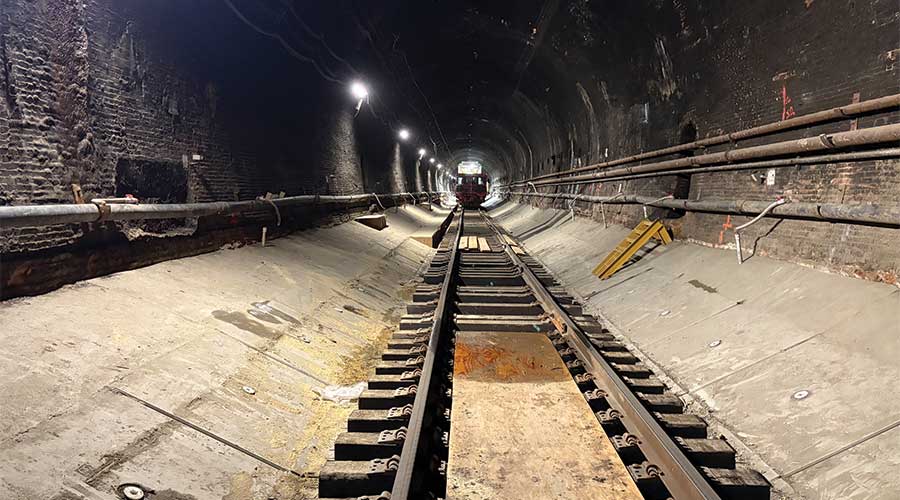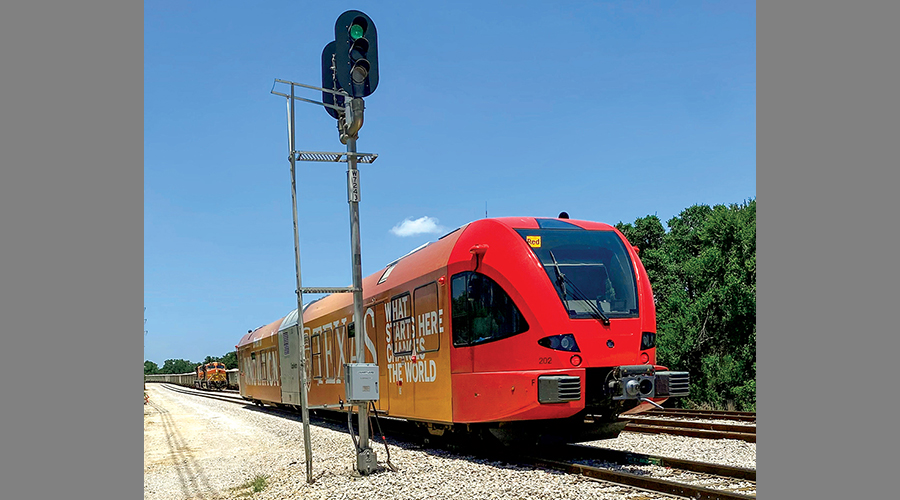Stay updated on news, articles and information for the rail industry
March 2016
Rail News: C&S
C&S suppliers offer a range of turnkey signal solutions to meet railroads' evolving needs

"We can stage/store pre–configured packaged signal assemblies to be delivered to a work site within hours," says R. J. Corman Signaling President Mike Wilson.
— by Pat Foran, editor
Some communication and signaling (C&S) suppliers integrate, deliver and install prepackaged signal material configured to a railroad’s specific needs. The aim: to provide replacement equipment on short — sometimes extremely short — notice.
To an extent, the service is an outcropping of the just-in-time delivery evolution in the logistics realm, and some C&S suppliers have been offering turnkey solutions for more than two decades.
For others, the fast delivery of prepackaged material is a service need that became acutely apparent during the past decade, particularly following devastating weather events — notably Hurricane Katrina in 2005.
And for some suppliers, providing prepackaged signal material is simply a natural evolution of their core business, particularly as positive train control (PTC) continues to alter the C&S technology landscape.
Progressive Railroading recently discussed the prepackaged signal material concept with a sampling of C&S execs, including R. J. Corman Signaling LLC President Mike Wilson, Assistant Vice President of Engineering Rocky Metz and Senior Systems Engineer Terry Wildermuth; and Siemens Rail Automation Vice President Brad Hall. Their insights follow.
A single signal source
For the past two decades, a desire by signal equipment producers to reduce manufacturing costs and the challenge of forecasting demand has driven up lead times for core signal equipment “to incredible levels,” says Corman’s Wilson.
In the past, core signal equipment — such as the crossing and interlocking control variety — was considered “shelf stock” that manufacturers produced to replenish minimum inventory levels. But when market demand lagged inventory levels by a matter of months, the entire supply chain was pressured.
“Today, even though equipment is modular and flexible, it is still built to order,” Wilson says.
That can be a problem after a hurricane, when a railroad experiences a washout and needs signal materials ASAP. The evolution of PTC, which heightened demand for certain control systems, also forced suppliers to think about how they’d fill orders in a timely fashion.
Enter the concept of prepackaged signal material, which can eliminate lag times required to build and wire assemblies.
Prepackaged signal material requires the development of clearly published standards and processes, as well as significantly better planning and forecasting, Wilson says.
“It forces you to really have to put a lot of thought into how things are configured,” he adds.
It’s helped to resolve the industry’s long lead-time problems, Corman officials believe. It’s also helping suppliers solve “real-time issues created by catastrophic incidents,” Wilson says.
The prepackaged signal material evolution also happened to dovetail with the “one-source” concept Corman’s been nurturing for years. In 2013, R. J. Corman Railroad Group formed R. J. Corman Signaling.
“With our regional reach of our material sales and emergency services companies, and working in lock-step with our track construction company, we can stage/store pre-configured packaged signal assemblies to be delivered to a work site within hours,” says Wilson.
The company also can place engineers and support staff “right on the job site” by outfitting mobile command centers with “the tools and equipment needed to run every facet of a signaling operation,” he adds.
‘It’s a core business’
Siemens Rail Automation provides train control systems, including PTC and communications-based train control, and supplies equipment for grade crossing warning, wayside signaling, remote monitoring/reporting, switch machines and classification yards.
Siemens also supplies electronic interlockings turnkey as preconfigured container solutions.
“We deliver projects in containers or on flatbeds,” Siemens’ Hall says. “If a Class I orders a crossing or a wayside house, we put the entire thing together, prewire it, containerize all the pieces and ship it to where they need it. It’s a core business for us.”
And it’s a business that, for Siemens, dates back to the early to mid-1990s.
“We started doing it to help facilitate delivery material so it was all in one place,” Hall says. “It just made it easier for our customers.”
Since the mid-1990s, the company also has offered what Hall terms an “emergency knock down” service.
“We can respond quickly and have everything in one place and [shipped] in a container,” he says. “They don’t have to look through all their storage depots and across their networks for parts.”
Siemens signal professionals are always on call.
“Generally, we will have what they need within 24 to 48 hours,” Hall says. “The emergency service is also a core business for us. Customers see value in it, as well.”
Email comments or questions to pat.foran@tradepress.com.


 CSX Focuses On Two Major Projects, More Fluid Network
CSX Focuses On Two Major Projects, More Fluid Network
 Introducing The Rising Stars Of 2025
Introducing The Rising Stars Of 2025
 From The Editor: Of Tariffs And A ‘Trade Storm’
From The Editor: Of Tariffs And A ‘Trade Storm’
 Women of Influence in Rail eBook
Women of Influence in Rail eBook
 railPrime
railPrime







